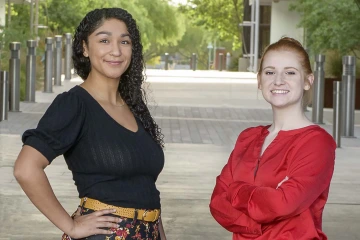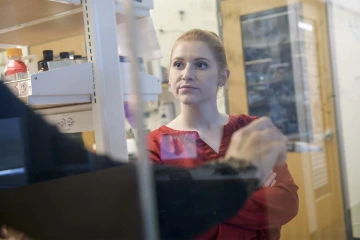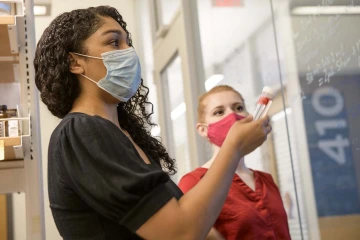Meet the Newest College of Pharmacy Alumni Fighting Alzheimer’s
University of Arizona College of Pharmacy alumni Jaesa Strong and Christina Moehring are 2020 graduates of the Bachelor of Science in Pharmaceutical Sciences program, a degree that served as a launchpad for a startup called Cliacept Inc., whose goal is to take what they discovered as undergrads and turn it into a treatment for Alzheimer’s disease. Strong is the company’s chief executive officer. Moehring is the chief scientific officer and has just finished her first year in the College of Pharmacy’s PharmD program.

Jaesa Strong and Christina Moehring helped launch a homegrown startup with the goal to stop or even reverse the progression of Alzheimer’s disease.
Alzheimer’s disease touches most families, striking 1 in 9 people 65 and older, with the burden disproportionately falling on women and Black and Hispanic individuals. The Cliacept team is investigating an antibody that can disable a protein on a rogue brain cell and decrease neuroinflammation, which they believe is one of the disease’s root causes.
Strong and Moehring discussed their hopes for their treatment and what it has been like to launch a startup immediately after completing their undergraduate degrees.
How do you hope your antibody treatment for Alzheimer’s disease will work?
Moehring: Our drug candidate is a much different mechanism and a much different type of treatment: an antibody against the CLIC-1 protein. Introducing an antibody into the treatment of Alzheimer’s disease could be something really new.

Christina Moehring, Cliacept’s chief scientific officer, describes herself as “super nerdy about science.”
Normally, CLIC-1 is inside of the brain’s microglial cell, but in Alzheimer’s, it’s upregulated and on the surface of the cell. Our goal is to have the antibody bind to the CLIC-1 protein on the surface of the cell and inactivate it. It would disable CLIC-1 from releasing neurotoxins that damage nearby nerves and lead to cell death throughout the brain. We will decrease inflammation and disease progression.
Since we are working with the brain, which is essentially the person’s consciousness, we’ve got to worry about the consequences that can come from any off-target effects of the drug.
Did you ever expect that you would gravitate toward the business side of medical research?
Moehring: No, it had never occurred to me. The science is something I’m really passionate about. I’m super nerdy about science and how drugs work. It’s always fascinated me that you can put a small molecule into your body, like ibuprofen, and it has this effect on you. But even though I’m not a very business-oriented person, I’m learning a lot about the business part. It’s really interesting to see that there are so many components to being a startup company, especially in science. It’s been really enlightening to be a part of the process.

Jaesa Strong, Cliacept’s chief executive officer, says launching a business is something she has “dreamed about from a young age.”
Strong: Growing up, I’ve always been very business oriented and wanted to own my own business someday. I thought it would be something that I would want to jump into to try to change the world. Once I found out how long the process is and how much it costs, I was a bit discouraged. In Dr. Khanna’s course, I realized that, although it costs millions and billions of dollars, you raise that money. I continued on with that dream I had. I still feel like owning your own business is part of being successful and independent.
When you were a kid, did you have any female role models in the business world?
Strong: It’s mostly been all men. Our company is women-owned. I feel that as a woman, as a minority, I’m adding representation for other people who see all of the men in it. It’s important to change the narrative so people know it’s not only men who do this.
Is the low success rate in drug discovery daunting to you, or have you accepted it as part of the process?
Strong: It’s a bit discouraging, but I have accepted it as part of the process. I know, at the end of the day, this kind of research is needed to make a big change for people’s health, so it’s important to accept that.
Moehring: I feel like it has such a big potential to go somewhere, but even if it doesn’t, I feel so much more comfortable getting out of my comfort zone. A few years ago, I would never have considered anything business related. Now I feel more whole, because I’m able to delve into these things that are so new to me, and I know they’re so important. I have faith in our drug candidate, and for the good of society, I really, really hope that it works.

